 Tìm kiếm
Tìm kiếm
Chương XIV Luật Thi hành án hình sự 2019: Giải quyết khiếu nại, tố cáo trong thi hành án hình sự
| Số hiệu: | 41/2019/QH14 | Loại văn bản: | Luật |
| Nơi ban hành: | Quốc hội | Người ký: | Nguyễn Thị Kim Ngân |
| Ngày ban hành: | 14/06/2019 | Ngày hiệu lực: | 01/01/2020 |
| Ngày công báo: | 21/07/2019 | Số công báo: | Từ số 575 đến số 576 |
| Lĩnh vực: | Trách nhiệm hình sự | Tình trạng: | Còn hiệu lực |
TÓM TẮT VĂN BẢN
Phạm nhân đồng tính, chuyển giới được bố trí giam giữ riêng
Đây là nội dung nổi bật trong Luật Thi hành án hình sự 2019 được Quốc hội khóa XIV thông qua ngày 14/6/2019.
Theo đó, những phạm nhân đồng tính, chuyển đổi giới tính, hoặc chưa xác định rõ giới tính có thể được bố trí giam giữ riêng.
Ngoài ra, việc giam giữ phạm nhân được thực hiện như sau:
- Căn cứ vào tính chất của tội phạm, mức hình phạt, đặc điểm nhân thân thì Giám thị trại giam sẽ quyết định phân loại, chuyển khu giam giữ; phạm nhân được chia thành các đội, tổ để lao động, học tập và sinh hoạt.
- Trong thời gian chấp hành án phạt tù, phạm nhân được nhận xét, đánh giá kết quả chấp hành án phạt theo tuần, tháng, quý, 06 tháng và 01 năm; đảm bảo tính liên tục, khách quan, công bằng, công khai, dân chủ.
- Phạm nhân được phép nhận quà là tiền, đồ vật do thân nhân gửi qua đường bưu chính, nhưng không được quá 02 lần trong 01 tháng.
Luật Thi hành án hình sự 2019 có hiệu lực từ ngày 01/01/2020.
Văn bản tiếng việt
Văn bản tiếng anh
1. Người, pháp nhân thương mại chấp hành án hình sự và cơ quan, tổ chức, cá nhân khác có liên quan (sau đây gọi là người khiếu nại) có quyền khiếu nại đối với quyết định, hành vi của cơ quan, người có thẩm quyền thi hành án hình sự nếu có căn cứ cho rằng quyết định, hành vi đó là trái pháp luật, xâm phạm quyền, lợi ích hợp pháp của mình. Việc khiếu nại của pháp nhân thương mại chấp hành án được thực hiện thông qua người đại diện theo pháp luật của pháp nhân thương mại.
2. Thời hiệu khiếu nại lần đầu là 30 ngày kể từ ngày nhận hoặc biết được quyết định, hành vi thi hành án hình sự mà người khiếu nại cho rằng có vi phạm pháp luật. Thời hiệu khiếu nại lần hai là 15 ngày kể từ ngày nhận được quyết định giải quyết khiếu nại của người có thẩm quyền.
Trường hợp vì lý do bất khả kháng hoặc trở ngại khách quan mà người khiếu nại không thực hiện được quyền khiếu nại theo đúng thời hiệu thì thời gian có lý do bất khả kháng hoặc trở ngại khách quan đó không tính vào thời hiệu khiếu nại.
1. Quyết định, hành vi bị khiếu nại không liên quan trực tiếp đến quyền, lợi ích hợp pháp của người khiếu nại.
2. Người khiếu nại là cá nhân không có năng lực hành vi dân sự đầy đủ mà không có người đại diện, trừ trường hợp pháp luật có quy định khác.
3. Người đại diện không có giấy tờ chứng minh về việc đại diện hợp pháp của mình.
4. Thời hiệu khiếu nại đã hết.
5. Việc khiếu nại đã có quyết định giải quyết khiếu nại có hiệu lực thi hành.
1. Chủ tịch Ủy ban nhân dân cấp xã giải quyết khiếu nại đối với quyết định, hành vi trái pháp luật của cơ quan, tổ chức, người có liên quan trong quản lý, giám sát, giáo dục người chấp hành án hình sự ở xã, phường, thị trấn.
2. Thủ trưởng cơ quan thi hành án hình sự Công an cấp huyện giải quyết khiếu nại đối với quyết định, hành vi sau đây:
a) Quyết định, hành vi trái pháp luật của Phó thủ trưởng, sĩ quan, hạ sĩ quan, chiến sĩ thuộc quyền quản lý của cơ quan thi hành án hình sự Công an cấp huyện, trừ trường hợp quy định tại khoản 8 Điều này;
b) Quyết định, hành vi trái pháp luật của Chủ tịch Ủy ban nhân dân cấp xã, Ủy ban nhân dân cấp xã được Tòa án giao giám sát, giáo dục đối với người chấp hành án;
c) Quyết định giải quyết khiếu nại của Chủ tịch Ủy ban nhân dân cấp xã được Tòa án giao giám sát, giáo dục đối với người chấp hành án.
3. Trưởng Công an cấp huyện giải quyết khiếu nại đối với quyết định, hành vi sau đây:
a) Quyết định, hành vi trái pháp luật của Thủ trưởng cơ quan thi hành án hình sự Công an cấp huyện;
b) Quyết định giải quyết khiếu nại của Thủ trưởng cơ quan thi hành án hình sự Công an cấp huyện.
4. Thủ trưởng cơ quan thi hành án hình sự Công an cấp tỉnh giải quyết khiếu nại đối với quyết định, hành vi sau đây:
a) Quyết định, hành vi trái pháp luật của sĩ quan, hạ sĩ quan, chiến sĩ thuộc quyền quản lý của cơ quan thi hành án hình sự Công an cấp tỉnh, trừ trường hợp quy định tại khoản 8 Điều này;
b) Quyết định, hành vi trái pháp luật của cơ quan, cá nhân có thẩm quyền trong thi hành án hình sự đối với pháp nhân thương mại.
5. Giám đốc Công an cấp tỉnh giải quyết khiếu nại đối với quyết định, hành vi sau đây:
a) Quyết định, hành vi trái pháp luật của Thủ trưởng cơ quan thi hành án hình sự Công an cấp tỉnh;
b) Quyết định giải quyết khiếu nại của Thủ trưởng cơ quan thi hành án hình sự Công an cấp tỉnh, Trưởng Công an cấp huyện.
6. Thủ trưởng cơ quan quản lý thi hành án hình sự thuộc Bộ Công an giải quyết khiếu nại đối với quyết định, hành vi trái pháp luật của sĩ quan, hạ sĩ quan, chiến sĩ thuộc quyền quản lý của cơ quan quản lý thi hành án hình sự thuộc Bộ Công an, trừ trường hợp quy định tại khoản 8 Điều này.
7. Bộ trưởng Bộ Công an giải quyết khiếu nại đối với quyết định, hành vi sau đây, trừ trường hợp quy định tại khoản 8 Điều này:
a) Quyết định, hành vi trái pháp luật của Thủ trưởng cơ quan quản lý thi hành án hình sự thuộc Bộ Công an;
b) Quyết định giải quyết khiếu nại của Giám đốc Công an cấp tỉnh, Thủ trưởng cơ quan quản lý thi hành án hình sự thuộc Bộ Công an.
8. Viện trưởng Viện kiểm sát nhân dân cấp tỉnh, Viện trưởng Viện kiểm sát quân sự cấp quân khu, Viện trưởng Viện kiểm sát nhân dân cấp huyện giải quyết khiếu nại đối với quyết định, hành vi trái pháp luật trong quản lý, giáo dục phạm nhân của người được giao quản lý, giáo dục phạm nhân.
Viện trưởng Viện kiểm sát nhân dân cấp tỉnh giải quyết khiếu nại đối với quyết định giải quyết khiếu nại của Viện trưởng Viện kiểm sát nhân dân cấp huyện. Viện trưởng Viện kiểm sát nhân dân tối cao, Viện trưởng Viện kiểm sát quân sự trung ương giải quyết khiếu nại đối với quyết định giải quyết khiếu nại của Viện trưởng Viện kiểm sát nhân dân cấp tỉnh, Viện trưởng Viện kiểm sát quân sự cấp quân khu. Quyết định giải quyết khiếu nại của Viện trưởng Viện kiểm sát cấp trên có hiệu lực thi hành.
1. Thủ trưởng cơ quan thi hành án hình sự cấp quân khu giải quyết khiếu nại đối với quyết định, hành vi trái pháp luật trong thi hành án hình sự của sĩ quan, quân nhân chuyên nghiệp, hạ sĩ quan, chiến sĩ của đơn vị quân đội, cơ quan thi hành án hình sự cấp quân khu, trừ trường hợp quy định tại khoản 8 Điều 178 của Luật này.
2. Tư lệnh quân khu và tương đương giải quyết khiếu nại đối với quyết định, hành vi sau đây, trừ trường hợp quy định tại khoản 8 Điều 178 của Luật này:
a) Quyết định, hành vi trái pháp luật của Thủ trưởng cơ quan thi hành án hình sự cấp quân khu;
b) Quyết định giải quyết khiếu nại của Thủ trưởng cơ quan thi hành án hình sự cấp quân khu.
3. Thủ trưởng cơ quan quản lý thi hành án hình sự thuộc Bộ Quốc phòng giải quyết khiếu nại đối với quyết định, hành vi trái pháp luật của sĩ quan, quân nhân chuyên nghiệp, hạ sĩ quan, chiến sĩ thuộc quyền quản lý của cơ quan quản lý thi hành án hình sự thuộc Bộ Quốc phòng, trừ trường hợp quy định tại khoản 8 Điều 178 của Luật này.
4. Bộ trưởng Bộ Quốc phòng giải quyết khiếu nại đối với quyết định, hành vi sau đây, trừ trường hợp quy định tại khoản 8 Điều 178 của Luật này:
a) Quyết định, hành vi trái pháp luật của Thủ trưởng cơ quan quản lý thi hành án hình sự thuộc Bộ Quốc phòng;
b) Quyết định, hành vi trái pháp luật của Tư lệnh quân khu và tương đương;
c) Quyết định giải quyết khiếu nại của Thủ trưởng cơ quan quản lý thi hành án hình sự thuộc Bộ Quốc phòng, Tư lệnh quân khu và tương đương.
1. Người khiếu nại có các quyền sau đây:
a) Tự mình khiếu nại hoặc thông qua người đại diện để khiếu nại trong bất kỳ thời gian nào của quá trình thi hành án hình sự;
b) Rút khiếu nại trong bất kỳ thời gian nào của quá trình giải quyết khiếu nại;
c) Được nhận văn bản trả lời về việc thụ lý giải quyết khiếu nại, nhận quyết định giải quyết khiếu nại;
d) Được khôi phục quyền, lợi ích hợp pháp đã bị xâm phạm, được bồi thường thiệt hại theo quy định của pháp luật.
2. Người khiếu nại có các nghĩa vụ sau đây:
a) Trình bày trung thực sự việc, cung cấp thông tin, tài liệu liên quan đến việc khiếu nại cho người giải quyết khiếu nại; chịu trách nhiệm trước pháp luật về nội dung trình bày và việc cung cấp các thông tin, tài liệu đó;
b) Chấp hành quyết định giải quyết khiếu nại có hiệu lực thi hành.
1. Người bị khiếu nại có các quyền sau đây:
a) Được thông báo về nội dung khiếu nại;
b) Đưa ra bằng chứng về tính hợp pháp của quyết định, hành vi thi hành án hình sự bị khiếu nại;
c) Được nhận quyết định giải quyết khiếu nại.
2. Người bị khiếu nại có các nghĩa vụ sau đây:
a) Giải trình về quyết định, hành vi thi hành án hình sự bị khiếu nại, cung cấp thông tin, tài liệu liên quan khi cơ quan, tổ chức, cá nhân có thẩm quyền yêu cầu;
b) Chấp hành quyết định giải quyết khiếu nại có hiệu lực thi hành;
c) Bồi hoàn, khắc phục hậu quả do quyết định, hành vi trái pháp luật của mình gây ra theo quy định của pháp luật.
1. Tiếp nhận, giải quyết khiếu nại đối với quyết định, hành vi bị khiếu nại.
2. Yêu cầu người khiếu nại, người bị khiếu nại giải trình, cung cấp thông tin, tài liệu liên quan đến việc khiếu nại.
3. Thông báo bằng văn bản về việc thụ lý để giải quyết, gửi quyết định giải quyết cho người khiếu nại.
4. Chịu trách nhiệm trước pháp luật về việc giải quyết khiếu nại của mình.
1. Thời hạn giải quyết khiếu nại lần đầu là 15 ngày kể từ ngày thụ lý khiếu nại.
2. Thời hạn giải quyết khiếu nại lần hai là 30 ngày kể từ ngày thụ lý khiếu nại.
3. Trường hợp cần thiết, đối với những vụ việc phức tạp thì thời hạn giải quyết khiếu nại quy định tại khoản 1 và khoản 2 Điều này có thể kéo dài thêm nhưng không quá 30 ngày.
1. Cơ quan, người có thẩm quyền phải tiếp nhận các khiếu nại trong thi hành án hình sự. Đối với khiếu nại của phạm nhân quy định tại khoản 8 Điều 178 của Luật này thì trong thời hạn 24 giờ kể từ khi tiếp nhận, Giám thị trại giam, Giám thị trại tạm giam, Thủ trưởng cơ quan thi hành án hình sự Công an cấp huyện phải chuyển ngay khiếu nại cho Viện kiểm sát có thẩm quyền.
2. Trong thời hạn 03 ngày làm việc kể từ ngày nhận được khiếu nại, cơ quan, người có thẩm quyền quy định tại khoản 1 Điều này, Điều 178 và Điều 179 của Luật này phải thụ lý để giải quyết và thông báo bằng văn bản cho người khiếu nại biết. Trường hợp không thụ lý khiếu nại để giải quyết thì phải thông báo bằng văn bản và nêu rõ lý do.
1. Hồ sơ giải quyết khiếu nại bao gồm:
a) Đơn khiếu nại hoặc văn bản ghi nội dung khiếu nại;
b) Văn bản giải trình của người bị khiếu nại;
c) Biên bản thẩm tra, xác minh, kết luận;
d) Quyết định giải quyết khiếu nại;
đ) Tài liệu khác có liên quan.
2. Hồ sơ giải quyết khiếu nại phải được đánh số bút lục và lưu giữ tại cơ quan giải quyết khiếu nại.
1. Sau khi thụ lý khiếu nại, người có thẩm quyền giải quyết khiếu nại quy định tại Điều 178 và Điều 179 của Luật này tiến hành xác minh, yêu cầu người khiếu nại, người bị khiếu nại giải trình, cung cấp thông tin, tài liệu liên quan đến việc khiếu nại; gặp cơ quan, tổ chức, cá nhân có liên quan để làm rõ nội dung khiếu nại và ra quyết định giải quyết khiếu nại lần đầu.
2. Quyết định giải quyết khiếu nại lần đầu có hiệu lực thi hành nếu trong thời hiệu do Luật này quy định mà người khiếu nại không khiếu nại tiếp.
1. Ngày, tháng, năm ra quyết định.
2. Họ, tên, địa chỉ của người khiếu nại, người bị khiếu nại.
3. Nội dung khiếu nại.
4. Kết quả xác minh nội dung khiếu nại.
5. Căn cứ pháp luật để giải quyết khiếu nại.
6. Kết luận về nội dung khiếu nại là đúng, đúng một phần hoặc sai toàn bộ.
7. Giữ nguyên, sửa đổi, hủy bỏ hoặc yêu cầu sửa đổi, hủy bỏ một phần quyết định bị khiếu nại hoặc buộc chấm dứt việc thực hiện quyết định, hành vi bị khiếu nại.
8. Việc bồi thường thiệt hại, khắc phục hậu quả do quyết định, hành vi trái pháp luật gây ra (nếu có).
9. Hướng dẫn quyền khiếu nại tiếp theo của đương sự.
1. Trường hợp tiếp tục khiếu nại thì người khiếu nại phải gửi đơn kèm theo bản sao quyết định giải quyết khiếu nại lần đầu và tài liệu liên quan cho người có thẩm quyền giải quyết khiếu nại lần hai.
2. Trong quá trình giải quyết khiếu nại lần hai, người có thẩm quyền giải quyết khiếu nại quy định tại Điều 178 và Điều 179 của Luật này có quyền yêu cầu người giải quyết khiếu nại lần đầu, cơ quan, tổ chức, cá nhân có liên quan cung cấp thông tin, tài liệu liên quan đến nội dung khiếu nại; triệu tập người bị khiếu nại, người khiếu nại khi cần thiết; xác minh, tiến hành các biện pháp khác theo quy định của pháp luật để giải quyết khiếu nại. Cơ quan, tổ chức, cá nhân khi nhận được yêu cầu phải thực hiện đúng các yêu cầu đó.
3. Quyết định giải quyết khiếu nại lần hai có hiệu lực thi hành.
1. Ngày, tháng, năm ra quyết định.
2. Họ, tên, địa chỉ của người khiếu nại, người bị khiếu nại.
3. Nội dung khiếu nại.
4. Kết quả xác minh nội dung khiếu nại.
5. Căn cứ pháp luật để giải quyết khiếu nại.
6. Kết luận về nội dung khiếu nại và việc giải quyết của người có thẩm quyền giải quyết khiếu nại lần đầu.
7. Giữ nguyên, sửa đổi, hủy bỏ hoặc yêu cầu sửa đổi, hủy bỏ một phần quyết định bị khiếu nại hoặc buộc chấm dứt thực hiện quyết định, hành vi bị khiếu nại; việc bồi thường thiệt hại, khắc phục hậu quả do quyết định, hành vi trái pháp luật gây ra.
Người chấp hành án và mọi công dân có quyền tố cáo với cơ quan, người có thẩm quyền về hành vi vi phạm pháp luật của bất kỳ người có thẩm quyền nào trong thi hành án hình sự mà gây thiệt hại hoặc đe dọa gây thiệt hại lợi ích của Nhà nước, quyền, lợi ích hợp pháp của cơ quan, tổ chức, cá nhân
Quyền và nghĩa vụ của người tố cáo, người bị tố cáo trong thi hành án hình sự được thực hiện theo quy định của Luật Tố cáo.
1. Thẩm quyền giải quyết tố cáo như sau:
a) Người đứng đầu cơ quan, tổ chức giải quyết tố cáo đối với hành vi vi phạm pháp luật của người thuộc thẩm quyền quản lý của cơ quan, tổ chức đó;
b) Chủ tịch Ủy ban nhân dân cấp xã giải quyết tố cáo đối với hành vi vi phạm pháp luật của Trưởng Công an cấp xã;
c) Trưởng Công an cấp huyện giải quyết tố cáo đối với hành vi vi phạm pháp luật của Thủ trưởng cơ quan thi hành án hình sự Công an cấp huyện;
d) Chủ tịch Ủy ban nhân dân cấp huyện giải quyết tố cáo đối với hành vi vi phạm pháp luật của Chủ tịch Ủy ban nhân dân cấp xã;
đ) Giám đốc Công an cấp tỉnh giải quyết tố cáo đối với hành vi vi phạm pháp luật của Thủ trưởng cơ quan thi hành án hình sự Công an cấp tỉnh;
e) Tư lệnh Quân khu và tương đương giải quyết tố cáo đối với hành vi vi phạm pháp luật của Thủ trưởng cơ quan thi hành án hình sự cấp quân khu;
g) Bộ trưởng Bộ Công an, Bộ trưởng Bộ Quốc phòng giải quyết tố cáo đối với hành vi vi phạm pháp luật của Thủ trưởng cơ quan quản lý thi hành án hình sự thuộc phạm vi quản lý.
h) Viện trưởng Viện kiểm sát có thẩm quyền giải quyết tố cáo đối với hành vi vi phạm pháp luật trong quản lý, giáo dục phạm nhân của người được giao quản lý, giáo dục phạm nhân.
2. Thời hạn giải quyết tố cáo là không quá 30 ngày kể từ ngày thụ lý giải quyết tố cáo; đối với vụ việc phức tạp thì có thể gia hạn giải quyết tố cáo một lần nhưng không quá 30 ngày; đối với vụ việc đặc biệt phức tạp thì có thể gia hạn giải quyết tố cáo 02 lần, mỗi lần không quá 30 ngày.
3. Tố cáo về hành vi vi phạm pháp luật có dấu hiệu tội phạm được giải quyết theo quy định của Bộ luật Tố tụng hình sự.
1. Cơ quan, người có thẩm quyền, trong phạm vi nhiệm vụ, quyền hạn của mình, có trách nhiệm tiếp nhận và giải quyết tố cáo kịp thời, đúng pháp luật; xử lý nghiêm minh người vi phạm; áp dụng biện pháp cần thiết nhằm ngăn chặn thiệt hại có thể xảy ra; bảo đảm cho quyết định giải quyết được thi hành nghiêm chỉnh và chịu trách nhiệm trước pháp luật về quyết định của mình.
2. Người có thẩm quyền giải quyết tố cáo mà không giải quyết, thiếu trách nhiệm trong việc giải quyết, giải quyết trái pháp luật thì tùy theo tính chất, mức độ vi phạm mà bị xử lý kỷ luật hoặc truy cứu trách nhiệm hình sự; nếu gây thiệt hại thì phải bồi thường theo quy định của pháp luật.
SETTLEMENT OF COMPLAINTS AND DENUNCIATIONS IN CRIMINAL JUDGMENT EXECUTION
Section 1. COMPLAINTS IN CRIMINAL JUDGMENT EXECUTION AND SETTLEMENT THEREOF
Article 176. Right to lodge complaints in criminal judgment execution
1. Criminally sentenced persons and sentenced corporate legal entities, and other related agencies, organizations and individuals (hereinafter referred to as complainants) may lodge complaints about decisions or acts of agencies and persons competent to execute criminal judgments if they have grounds to believe that these decisions or acts are unlawful and infringe upon their lawful rights and interests. The complaint of a sentenced corporate legal entity shall be lodged by the legal representative of the corporate legal entity.
2. The prescriptive period for lodging first-lime complaint is 30 days after receiving or becoming aware of a decision or an act of criminal judgment execution which the complainant considers unlawful. For subsequent complaints, the applicable prescriptive period is 15 days after receiving a complaint settlement decision of a competent person.
In case a person is unable to lodge his/her complaint within the prescriptive period due to force majeure events or objective hindrance, the period during which such impediment exists shall be excluded from the prescriptive period for lodging complaint.
Article 177. Cases in which a complaint about criminal judgment execution is not accepted for settlement
1. The complained decision or act is not directly related to the lawful rights and interests of the complainant.
2. The complainant has neither full legal capacity nor a lawful representative, unless otherwise provided by law.
3. The representative has no proof of his/her lawful representation.
4. The prescriptive period for lodging a complaint has expired.
5. The complaint has been already settled under a legally effective decision.
Article 178. Competence to settle complaints in criminal judgment execution
1. Chairpersons of commune-level People's Committees shall settle complaints about unlawful decisions or acts of agencies, organizations and individuals assigned to supervise and educate persons serving criminal sentences in their communes, wards or townships.
2. Heads of criminal judgment execution agencies of district-level police offices shall settle complaints about:
a) Unlawful decisions or acts of deputy heads, officers, non-commissioned officers and soldiers under management of the criminal judgment execution agency of district-level police office, except the case specified in Clause 8 of this Article;
b) Unlawful decisions or acts of chairpersons of commune-level People's Committees, the People’s Committees of communes which are assigned by the courts to supervise and educate sentenced persons;
c) Complaint settlement decisions of chairpersons of commune-level People's Committees assigned to supervise and educate sentenced persons.
3. District-level police chiefs shall settle complaints about:
a) Unlawful decisions or acts of heads of criminal judgment execution agencies of district-level police offices;
b) Complaint settlement decisions of heads of criminal judgment execution agencies of district-level police offices.
4. Heads of criminal judgment execution agencies of provincial-level police departments shall settle complaints about:
a) Unlawful decisions or acts of deputy heads, officers, non-commissioned officers and soldiers under management of the criminal judgment execution agency of provincial-level police department, except the case specified in Clause 8 of this Article;
b) Unlawful decisions or acts of competent agencies and individuals in criminal judgment execution against corporate legal entities.
5. Directors of provincial-level police departments shall settle complaints about:
a) Unlawful decisions or acts of heads of criminal judgment execution agencies of provincial-level police departments;
b) Complaint settlement decisions of heads of criminal judgment execution agencies of provincial-level police departments and district-level police chiefs.
6. The head of the criminal judgment execution management agency of the Ministry of Public Security shall settle complaints about unlawful decisions or acts of officers, noncommissioned officers and soldiers under his/her agency's management, except the case specified in Clause 8 of this Article.
7. The Minister of Public Security shall settle complaints about the following decisions and acts, except the case specified in Clause 8 of this Article:
a) Unlawful decisions or acts of the head of the criminal judgment execution management agency of the Ministry of Public Security;
b) Complaint settlement decisions of directors of provincial-level police departments and the head of the criminal judgment execution management agency of the Ministry of Public Security.
8. Chief procurators of provincial-level, military zone-level and district-level procuracies shall settle complaints about unlawful decisions or acts of persons assigned to supervise and educate inmates in performing their assigned tasks.
The chief procurator of provincial-level procuracy shall settle complaints against complaint settlement decisions of the chief procurators of district-level procuracies. The chief procurator of the Supreme People’s Procuracy, the chief procurator of the Central Military Procuracy shall settle complaints against complaint settlement decisions of the chief procurators of provincial-level people’s procuracy and military-zone military procuracy. Complaint settlement decisions of chief procurator of higher-level procuracies are legally effective for execution.
Article 179. Competence to settle complaints about criminal judgment execution in the People's Army
1. Heads of criminal judgment execution agencies of military zones shall settle complaints about unlawful decisions or acts of officers, professional servicemen, noncommissioned officers and soldiers of military units and criminal judgment execution agencies of military zones in criminal judgment execution, except the case specified in Clause 8, Article 178 of this Law.
2. Military zone commanders and holders of equivalent ranks shall settle complaints about the following decisions and acts, except for Clause 8 Article 178 of this Law:
a) Unlawful decisions or acts of heads of criminal judgment execution agencies of military zones;
b) Complaint settlement decisions of heads of criminal judgment execution agencies of military zones.
3. The head of the criminal judgment execution management agency of the Ministry of National Defense shall settle complaints about unlawful decisions or acts of officers, noncommissioned officers, professional servicemen and soldiers under management of the criminal judgment execution management agency of the Ministry of National Defense, except the case specified in Clause 8 Article 178 of this Law.
4. The Minister of National Defense shall settle complaints about the following decisions and acts, except for the case prescribed in Clause 8 Article 178 of this Law:
a) Unlawful decisions or acts of the head of the criminal judgment execution management agency of the Ministry of National Defense;
b) Unlawful decisions or acts of military zone commanders and holders of equivalent ranks;
c) Complaint settlement decisions of the head of the criminal judgment execution management agency of the Ministry of National Defense, military-zone commanders and holders of equivalent ranks.
Article 180. Rights and obligations of complainants in criminal judgment execution
1. A complainant has the following rights:
a) Lodge his/her complaint or authorize his/her lawful representative to do so in any stage of the criminal judgment execution process;
b) Withdraw complaints in any stage of the criminal judgment execution process;
c) Receive written replies on complaint settlement and receive complaint settlement decisions;
d) Have his/her infringed lawful rights and interests restored and receive compensations for damage in accordance with law.
2. A complainant has the following obligations:
a) Truthfully report on the case and provide information and documents to the complaint-settling person; to take responsibility before law for reported contents and provided information and documents;
b) Abide by legally effective complaint settlement decisions.
Article 181. Rights and obligations of complainees in criminal judgment execution
1. A complainee has the following rights:
a) Notify the complaint details;
b) Furnish proof of the lawfulness of his/her complained criminal judgment execution decision or act;
c) Receive a document on the settlement of the complaint.
2. A complainee has the following obligations:
a) Explain his/her complained criminal judgment execution decision or act, and provide relevant information and documents at the request of competent agencies, organizations and individuals;
b) Abide by legally effective complaint settlement decisions;
c) Reimburse and relieve the consequences caused by the illegal decisions or acts as per the law.
Article 182. Tasks and powers of persons competent to settle complaints in criminal judgment execution
1. Receive and settle complaints about criminal judgment execution decisions or acts.
2. Request complainants and complainees to give explanations and provide information and documents relevant to the complaints.
3. Notify in writing the acceptance of complaints for settlement and send settlement decisions to complainants.
4. Take legal liability for their settlement of complaints.
Article 183. Time limit for settlement of complaints in criminal judgment execution
1. The time limit for settlement of a first-time complaint is 15 days after this complaint is accepted for settlement.
2. The time limit for settlement of a second-lime complaint is 30 days after this complaint is accepted for settlement.
3. The time limit for settlement of a complaint prescribed in Clause 1 and Clause 2 of this Article may be prolonged when necessary in complicated cases for not exceeding 30 days after the expiration of the prescribed time limit.
Article 184. Receipt and acceptance for settlement of complaints in criminal judgment execution
1. Competent agencies and persons shall receive all complaints in criminal judgment execution. Within 24 hours after receiving complaints lodged by inmates as specified in Clause 8, Article 178 of this Law, superintendents of prisons or detention centers and heads of criminal judgment execution agencies of district-level police offices shall promptly forward these complaints to competent procuracies.
2. Within 3 working days after receiving complaints, competent agencies and persons defined in Clause 1 of this Article, Articles 178 and 179 of this Law shall accept them for settlement and notify in writing complainants of the acceptance. In case of refusal to accept a complaint for settlement, they shall reply in writing clearly stating the reason.
Article 185. Dossiers for settlement of complaints in criminal judgment execution
1. A complaint settlement dossier comprises:
a) Written complaint or written record of complaint details;
b) Written explanation of the complainee;
c) Written record of appraisal, verification and conclusion;
d) Complaint settlement decision;
dd) Other relevant documents.
2. Complaint settlement dossiers shall be numbered and preserved at complaint-settling agencies.
Article 186. Procedures for settlement of first-time complaints in criminal judgment execution
1. After accepting a complaint for settlement, a person competent to settle complaints defined in Articles 178 and 179 of this Law shall verify it by requesting the complainant and the complainee to give explanations and provide information and documents relevant to the complaint and meeting concerned agencies, organizations and individuals to clarify complaint details, and issue a first-time complaint settlement decision.
2. Should, within the prescriptive period prescribed in this Law, the complainant make no further complaint, the first-time complaint settlement decision will become legally effective for execution.
Article 187. Contents of first-time complaint settlement decisions in criminal judgment execution
1. Date of issuance.
2. Full names and addresses of the complainant and complainee.
3. Complaint details.
4. Results of verification of complaint details.
5. Legal grounds for the settlement of the complaint.
6. Conclusion that the complaint is totally right, partially right or totally wrong.
7. Upholding, modification, cancellation or request for partial modification or cancellation of the complained decision or forced termination of the execution of the complained decision or complained act.
8. Compensation for damage and remedy of consequences caused by the unlawful decision or act (if any).
9. Guidance on the right of the complainant to lodge further complaints.
Article 188. Procedures for settlement of second-time complaints in criminal judgment execution
1. In case of further lodging a complaint, a complainant shall send a written complaint enclosed with a copy of the first-time complaint settlement decision and relevant documents to a person competent to settle second-time complaints.
2. In the course of second-time complaint settlement, a person competent to settle complaints defined in Articles 178 and 179 of this Law may request the person who has settled the first-time complaint and concerned agencies, organizations and individuals to provide information and documents related to complaint details; summon the complainee and the complainant when necessary; and shall conduct verification and take other measures specified by law to settle the complaint. Upon receiving a request, agencies, organizations and individuals shall comply with such request.
3. Second-time complaint settlement decisions are legally effective for execution.
Article 189. Contents of a second-time complaint settlement decision in criminal judgment decisions
1. Date of issuance.
2. Full names and addresses of the complainant and complainee.
3. Complaint details.
4. Results of verification of complaint details.
5. Legal grounds for the settlement of the complaint.
6. Conclusion on complaint details and the settlement by the person competent to settle the first-time complaint.
7. Upholding, modification, cancellation or request for partial modification or cancellation of the complained decision or forced termination of the execution of the complained decision or complained act; compensation for damage and remedy of consequences caused by the unlawful decision or act.
Section 2. DENUNCIATIONS IN CRIMINAL JUDGMENT EXECUTION AND SETTLEMENT THEREOF
Article 190. Persons with the right to lodge denunciations in criminal judgment execution
Sentenced persons and all citizens may lodge with competent agencies and persons denunciations about illegal acts of any competent persons in criminal judgment execution which cause or threaten to cause damage to the interests of the State and the lawful rights and interests of agencies, organizations or individuals.
Article 191. Rights and obligations of denouncers and denouncees in criminal judgment execution
Rights and obligations of denouncers and denouncees in criminal judgment execution are stipulated in the Law on Denunciation.
Article 192. Competence and time limit for denunciation settlement
1. The competence to settle denunciations is as follows:
a) Denunciations about illegal acts in criminal judgment execution shall be settled by heads of agencies or organizations which manage denouncees;
b) Presidents of commune-level People's Committees shall settle denunciations about illegal acts of commune-level police chiefs;
c) District-level police chiefs shall settle denunciations about illegal acts of heads of criminal judgment execution agencies of district-level police offices;
d) Presidents of district-level People's Committees shall settle denunciations about illegal acts of presidents of commune-level People's Committees;
dd) Directors of provincial-level police departments shall settle denunciations about illegal acts of heads of criminal judgment execution agencies of provincial-level police departments;
e) Military zone commanders and holders of equivalent ranks shall settle denunciations about illegal acts of heads of criminal judgment execution agencies of military zones;
g) The Minister of Public Security and the Minister of National Defense shall settle denunciations about illegal acts of heads of criminal judgment execution management agencies.
h) Directors of competent procuracies shall settle denunciations about illegal acts of persons assigned to manage and educate inmates.
2. The time limit for settlement of a denunciation is 30 days after the date of its acceptance; regarding complicated cases, this time limit may be extended once but not exceeding 30 days; regarding extremely complicated cases, this time limit may be extended twice but not exceeding 30 days each.
3. Denunciations about illegal acts showing signs of crime shall be settled under the Criminal Procedure Code.
Article 193. Responsibilities of persons competent to settle denunciations
1. Competent agencies and persons shall, within the ambit of their tasks and powers, receive and settle denunciations in a prompt and lawful manner; strictly handle violators; take necessary measures to prevent damage; and assure that their settlement decisions are strictly executed and take legal responsibility for their decisions.
2. Persons competent to settle denunciations who fail to settle denunciations or lack responsibility in settling denunciations or unlawfully settle denunciations shall, depending on the nature and severity of their violations, be disciplined or examined for penal liability. If causing damage, they shall pay compensations under law.
Văn bản liên quan
Cập nhật
Điều 71. Hủy quyết định tha tù trước thời hạn có điều kiện
Điều 80. Hồ sơ thi hành án tử hình
Điều 81. Hoãn thi hành án tử hình
Điều 84. Quyết định thi hành án treo
Điều 110. Thủ tục miễn chấp hành thời hạn cấm cư trú còn lại
Điều 117. Thủ tục miễn chấp hành thời hạn quản chế còn lại
Bài viết liên quan
Bị cách chức có được hưởng lương hưu không?
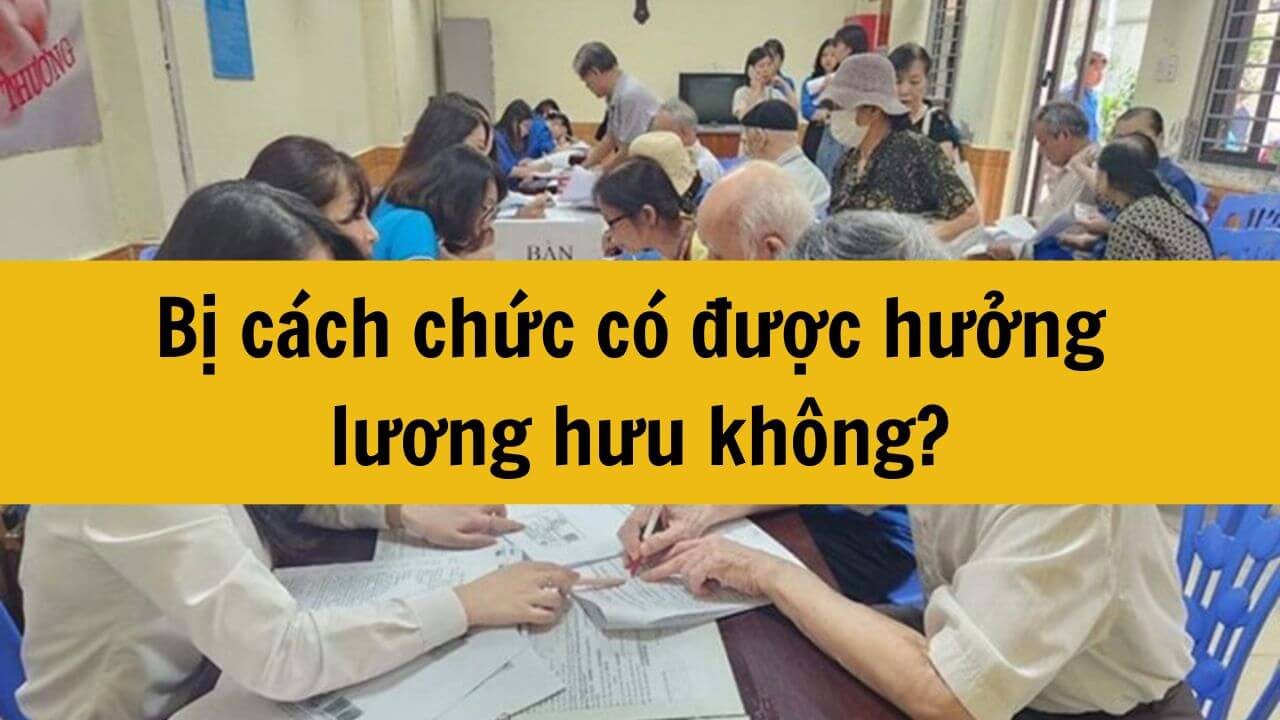
Bị cách chức có được hưởng lương hưu không?
Trong quá trình công tác, vì nhiều lý do khác nhau, một số cán bộ, công chức có thể bị cách chức hoặc kỷ luật. Một trong những câu hỏi thường gặp khi đó là liệu họ có còn được hưởng lương hưu sau khi nghỉ hưu hay không. Vấn đề này không chỉ ảnh hưởng đến quyền lợi cá nhân mà còn có tác động đến tài chính gia đình của người bị cách chức. Bài viết dưới đây sẽ giải đáp chi tiết về quy định pháp luật liên quan đến quyền lợi lương hưu trong trường hợp bị cách chức. 14/11/2024Bị khởi tố có được hưởng lương hưu không?

Bị khởi tố có được hưởng lương hưu không?
Khi một cá nhân bị khởi tố, nhiều vấn đề pháp lý và quyền lợi cá nhân sẽ phát sinh, trong đó có câu hỏi được nhiều người quan tâm. Liệu một người đang nhận lương hưu có tiếp tục được hưởng quyền lợi này khi bị khởi tố hay không? Đây là vấn đề không chỉ liên quan đến quyền lợi của người lao động sau khi nghỉ hưu mà còn ảnh hưởng đến gia đình và người thân của họ. Vậy hiện nay pháp luật quy định ra sao về vấn đề này. 14/11/2024Cán bộ, công chức đang đi tù có được hưởng lương hưu không?
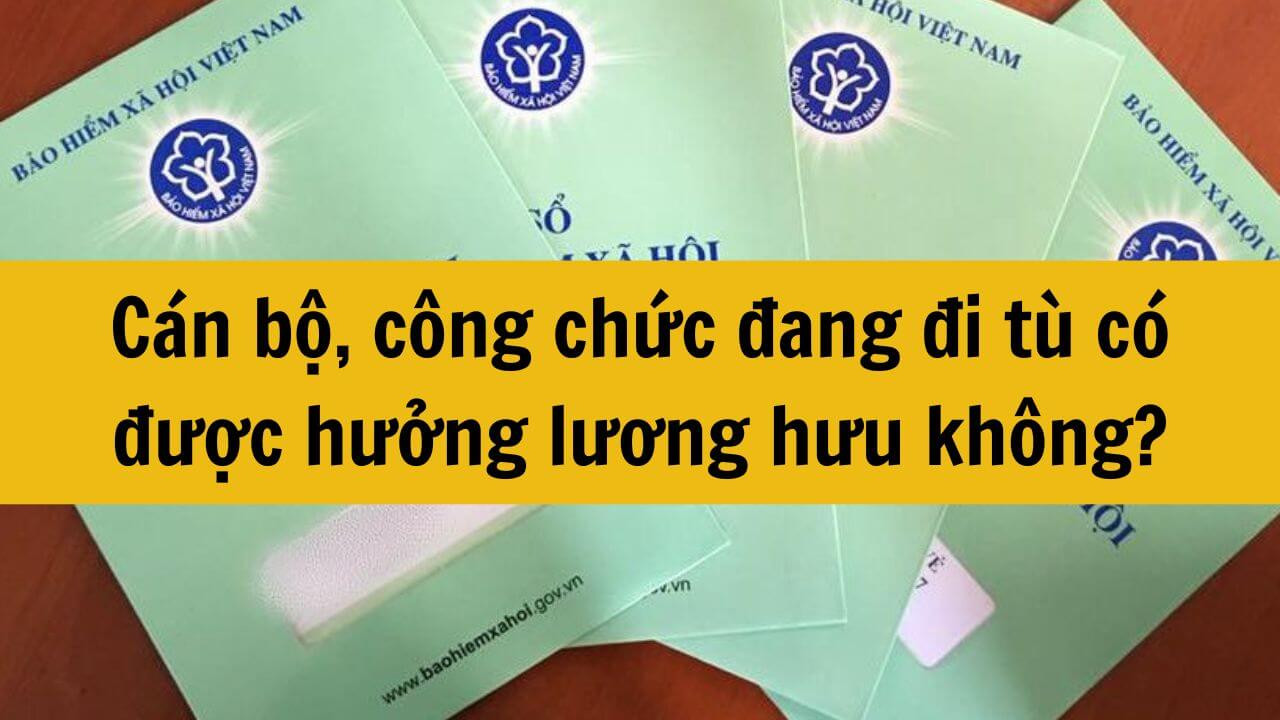
Cán bộ, công chức đang đi tù có được hưởng lương hưu không?
Khi cán bộ, công chức vi phạm pháp luật và phải thi hành án phạt tù, một câu hỏi đặt ra là liệu họ có tiếp tục được hưởng các quyền lợi về hưu trí, đặc biệt là lương hưu hay không. Đây là một vấn đề nhận được nhiều sự quan tâm, không chỉ vì quyền lợi cá nhân của người lao động mà còn ảnh hưởng đến ngân sách nhà nước và tính công bằng trong hệ thống an sinh xã hội. Vậy hiện nay, pháp luật có quy định ra sao về vấn đề này? 14/11/2024Mẫu hồ sơ mới nhất 2025 hưởng lương hưu đối với người lao động đang chấp hành hình phạt tù và hướng dẫn chi tiết
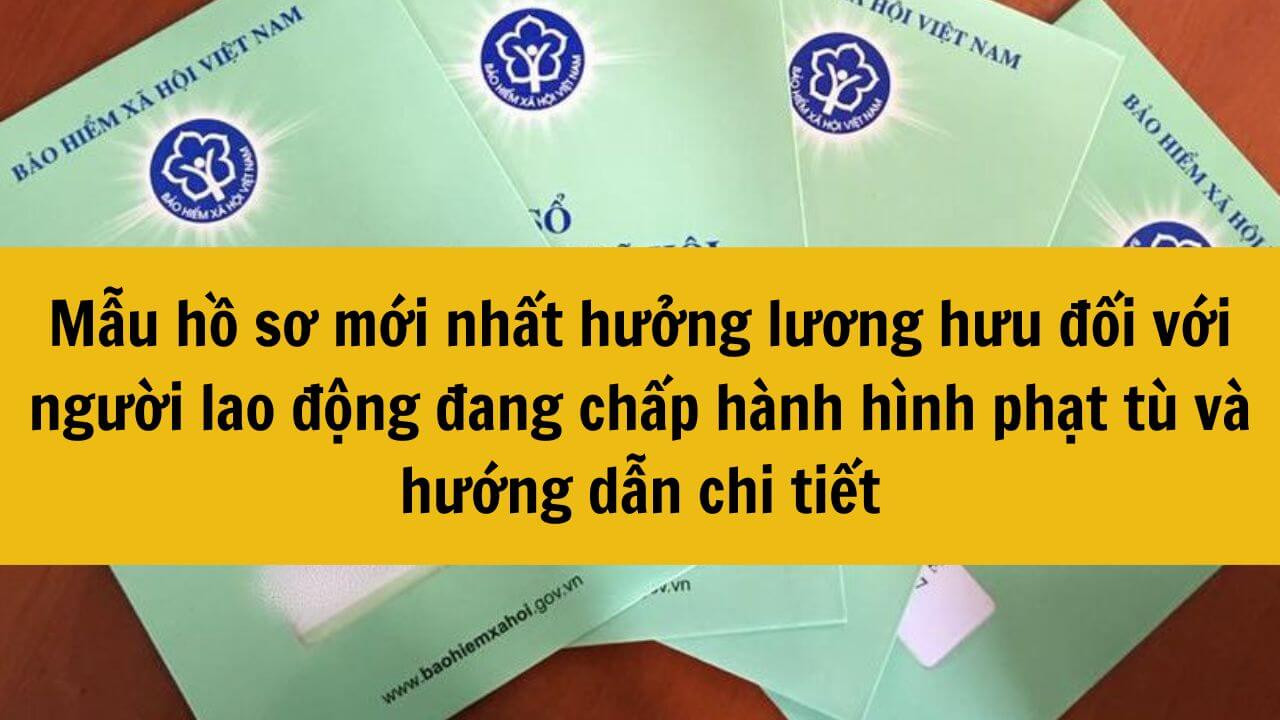
Mẫu hồ sơ mới nhất 2025 hưởng lương hưu đối với người lao động đang chấp hành hình phạt tù và hướng dẫn chi tiết
Trong bối cảnh nền kinh tế ngày càng phát triển, việc đảm bảo các quyền lợi cho mọi thành phần, kể cả những người lầm lỡ, trở nên ngày càng cần thiết. Một trong những vấn đề được nhiều người lao động quan tâm là việc những người bị kết án tù và phải đi tù có được hưởng lương hưu hay không, và nếu có thì cách thức nộp hồ sơ của họ như thế nào? Hãy cùng tìm hiểu sâu hơn về vấn đề này trong bài viết dưới đây. 14/11/2024Năm 2025 người lao động đi tù có được hưởng lương hưu không?
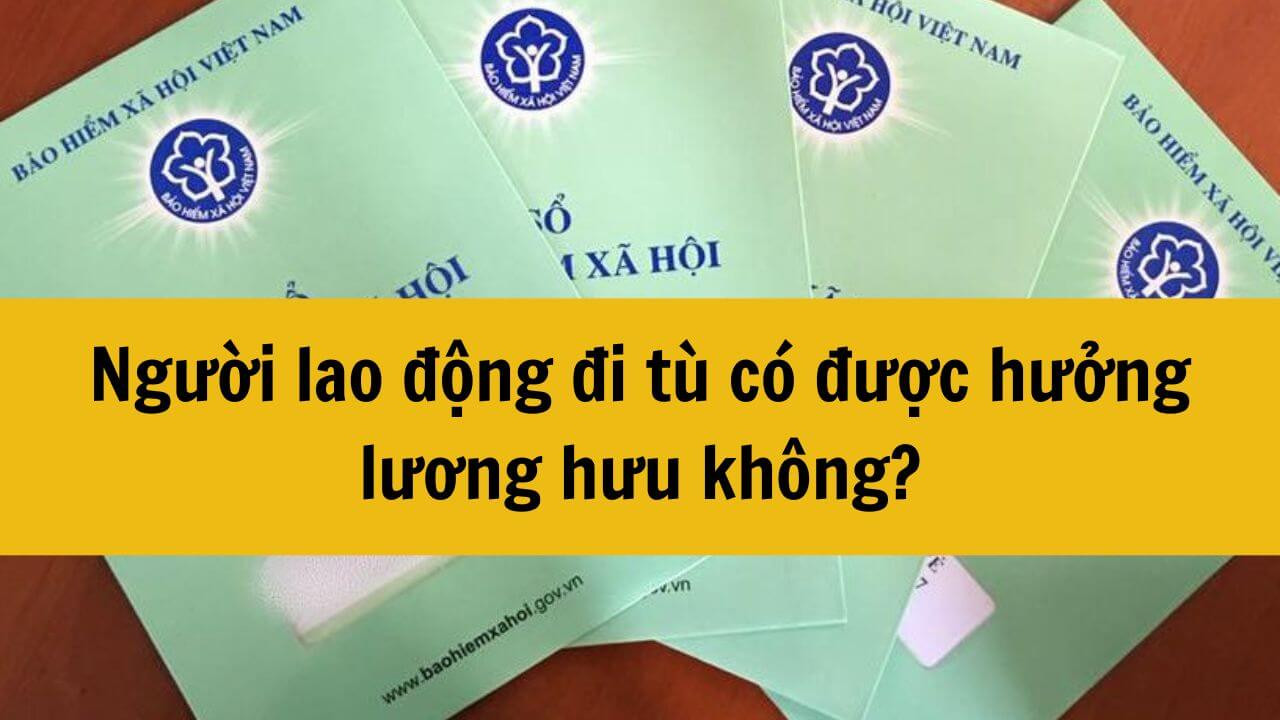
Năm 2025 người lao động đi tù có được hưởng lương hưu không?
Trong bối cảnh nền kinh tế ngày càng phát triển, việc đảm bảo các quyền lợi cho mọi thành phần, kể cả những người lầm lỡ, trở nên ngày càng cần thiết. Một trong những vấn đề được nhiều người lao động quan tâm là việc những người bị kết án tù và phải đi tù có được hưởng lương hưu hay không. Hãy cùng tìm hiểu sâu hơn về vấn đề này để có cái nhìn rõ ràng hơn về chính sách lương hưu và quyền lợi của người lao động trong năm 2025. 14/11/2024Hình phạt bổ sung đối với người được hưởng án treo
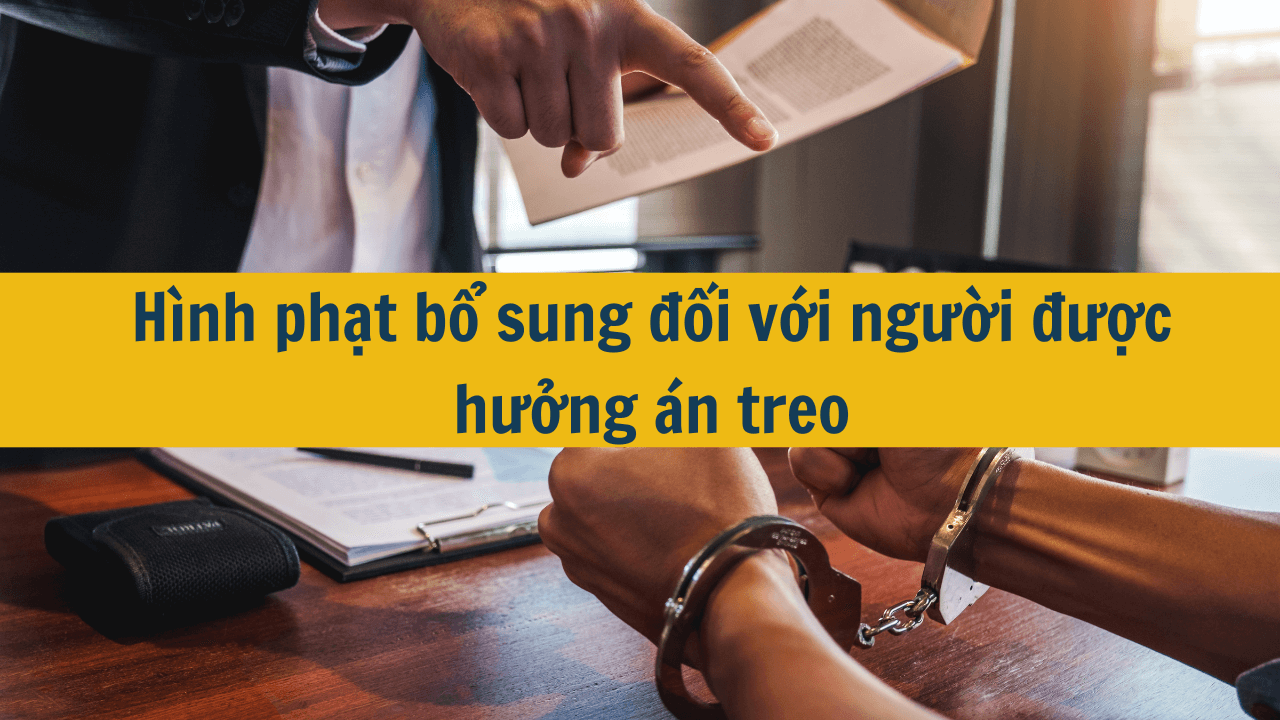
Hình phạt bổ sung đối với người được hưởng án treo
Tù treo hay án treo là biện pháp miễn chấp hành hình phạt tù có điều kiện, được Tòa án áp dụng đối với người phạm tội bị phạt tù không quá 03 năm, căn cứ vào nhân thân của người phạm tội và các tình tiết giảm nhẹ, xét thấy không cần bắt họ phải chấp hành hình phạt tù. Trong trường hợp phạt bổ sung thì quy định như thế nào? 10/11/2024Những ngành nghề cần có bằng cử nhân Luật

Những ngành nghề cần có bằng cử nhân Luật
Bằng cử nhân luật mở ra rất nhiều cơ hội nghề nghiệp đa dạng và hấp dẫn. Với kiến thức chuyên sâu về pháp luật, người tốt nghiệp ngành luật có thể lựa chọn làm việc tại nhiều lĩnh vực khác nhau. Dưới đây là một số ngành nghề phổ biến mà bạn có thể tham khảo. 06/11/2024Án treo là gì? Điều kiện hưởng án treo theo quy định pháp luật hiện hành


 Luật Thi hành án hình sự 2019 (Bản Word)
Luật Thi hành án hình sự 2019 (Bản Word)
 Luật Thi hành án hình sự 2019 (Bản Pdf)
Luật Thi hành án hình sự 2019 (Bản Pdf)